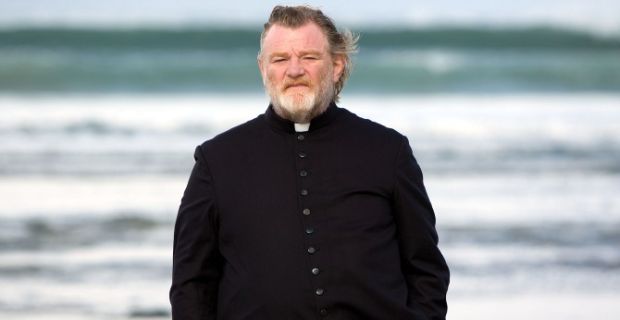
Film: Calvary
Directed by: John Michael McDonagh
Starring: Brendan Gleeson, Chris O’ Dowd, Kelly Reilly
Although Calvary may not be as functional as director John Michael McDonagh’s previous, hilarious film, The Guard, it makes a solid case that Brendan Gleeson can carry a film that has so much thematic weight. Calvary is a downright dark and bleak film held up by short instances of jet-black comedic relief. Any film that can make the audience laugh at a bar full of drunks talking about their infidelities whilst having a priest display his disdain in spades, with only his face, is a film that has a good grasp on its concept.
Calvary follows Father James Lavelle as he is threatened during confession. The man confessing says that he was abused by a priest that is now dead and that he is choosing to kill Father James not because he did something wrong but because he is a good priest. Father James’ suicidal daughter, Fiona (Kelly Reilly), comes to visit during this trying time as James must come to terms with how much faith he really has. Along the way he deals with a multitude of the Irish town’s dysfunctional inhabitants as he tries to find out who the man was that threatened him during confession.
John Michael McDonagh (brother of the immaculately talented In Bruges writer and director Martin McDonagh) proved with The Guard that he can handle quick-witted comedy that doesn’t just apply to one type of viewer. With Calvary, he proves that not only does he have a beautiful visual eye for the Irish countryside but also that he can handle a concept with such thematically troubling depth. The way McDonagh makes Calvary is near-genius in that even when the sun is out, it is still dark. It helps paint the picture that Father James has something dark looming around him at all times and that he can’t escape it. This is where the best facet of the film comes out. It’s all about how Father James deals with this abstract sense of looming fate that is always around him that makes the film so enthralling to watch.
One certain story element that delves into Father James’ past is one of the reasons that this film functions so well. We meet the main character at a very dark time in his life and in a lot of films, that kind of dread that the character will have isn’t given context. In this though, we learn about the recent past of Father James’ story and why he is where he is. This may feel like a generic point to make but it certainly helps to slide into this otherwise completely dour tale about lack of faith.
One thing that took me by storm in Calvary is the serious turn by Chris O’Dowd. Up until now, O’Dowd has only really played the a-hole antagonist or hapless loner friend that we grow to love. In this though, we get a man that tries his hardest to mask what is wrong with his life and marriage. It is a pure joy to see him carry such dramatic gravity so easily, and if any, his is the one role that does more than just ‘help’ create the dark universe in which the story takes place. That isn’t to take away from another dramatic turn by Kelly Reilly though. She showed that she could act with the best of them as a heroin junkie in 2012’s Flight (not to mention as a hunted vacationer in 2008’s Eden Lake), and in this she brings emotional context to Father James’ persona as his daughter.
One major facet to the film that I felt could have been left out is the ending. No spoilers, but a cold finish with no closure to Father James’ situation could have sufficed because we watch him wrestle with his amount of faith over the course of the whole film. If the man who threatened him gets caught, it doesn’t really matter. The ending functions in purely just a consequential way, providing closure for all parties involved in the story. This isn’t needed though.
The most captivating thing about Calvary is how it treats the subject of faith. We follow a priest; therefore we are getting the man who is closest to God according to the Christian church. We are getting a man who is technically a representation of God, sent to do tasks including reading last rites and such. McDonagh, who also wrote the script, treats the main character like a man that actually is an extension of God being troubled with the burden of having power in faith. How far would a man go for what he believes in? Would he go far enough to sacrifice himself in the name of faith? These are all critical questions brought up in Calvary that drive the narrative of the whole film. Calvary is a dark, grim, and long trip down a man’s psychosis that is burdened with the question of faith, but boy is it a rewarding one.
GRADE: B+
Review written by: Sam Cohen — (Follow him on Twitter)
- MOVIE REVIEW: ‘Popstar’ has at least a few hits - June 3, 2016
- MOVIE REVIEW: ‘Neighbors 2: Sorority Rising’ is the rare sequel that tries - May 21, 2016
- MOVIE REVIEW: ‘The Nice Guys’ is a loopy, drunk masterpiece - May 20, 2016
